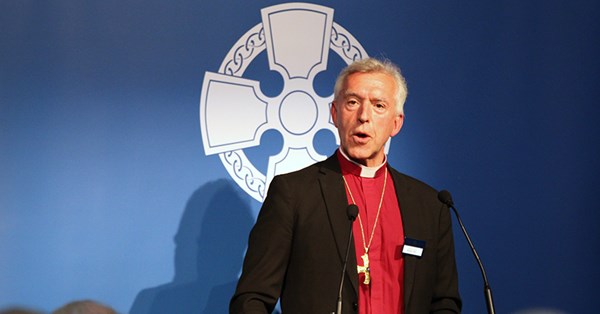THE Church in Wales has a significant part to play in the life of the nation, and must adapt and develop “ever more courageously” as it responds to new challenges, its Archbishop, the Most Revd Andrew John, told the Governing Body meeting in a presidential address in Llandudno, on Wednesday.
He had earlier reflected on the nation’s identity as something that “shifts and grows, forged in triumphs and tragedies alike — in the coal dust of the valleys, the scars of the quarry, in the defiance of Owain Glyndwr, in the sad memory of Aberfan. . . What is true for the nation is also true for the Church, shaped by revivals, a rich hymnody, the stories of saints and pioneers who founded communities of faith across the nation.”
Calling for the Church to become a more professional, grounded, compassionate, connected and creative Church, he first highlighted safeguarding. “At the heart of our calling is the care of others, especially the vulnerable,” he said. “If we fail here, we fail everywhere.
“So, our aim is to create a safe Church where good safeguarding practice is embedded in the very DNA of our life together — where it becomes instinctive, reflexive, woven into our ministry at every level, in a way that makes it harder to hide abuse and in which positive behaviours become normative. . . We must get this right, and we must be rigorous.”
Bishops in the Church in Wales have embarked on consultations on the liturgical provision for same-sex couples: a process the Archbishop commended as “respectful listening. . . If we are to walk together through complex matters, it must begin with the humility to listen well. Developing this mindset is to recognise we need to do discernment better.”
Addressing the desire to be a more grounded Church, he referred to, as “an extremely positive experience”, the Church in Wales sponsored summit on restoring Welsh rivers, which brought together 90 delegates from across different sectors in November 2024 to share a common concern (News, 17 April and 8 November 2024).
“What that summit revealed is that the Church has a significant role to play in the life of the nation,” he said. “We can bring people together. We have been told we have a unique role and place. We can help align values and efforts. We can encourage collaboration where there might otherwise be fragmentation.
“The summit was not a one-off. It was a statement that the Church in Wales will be present in the public square, attentive to the cry of the earth as much as the cry of the people of Wales. And, in 2026, we will build on this with a new summit, exploring how the Church can speak and act wisely in the face of pressing societal changes.”
The Archbishop went on to describe artificial intelligence (AI) — a subject on which he had spoken at the European Peace Conference in Paris in September 2024 — as “one of the most complex and fast-moving issues of our time. . . AI holds enormous promise for health care, education, even climate action.
“But without a shared ethical framework and regulatory oversight, it could deepen inequalities and accelerate harm, including the development of awful and destructive weaponry.
“We lack what the late Pope Francis has called for: an internationally agreed ethical framework with the power to hold developers and nations accountable, and an oversight arrangement with power to compel compliance. . . We need to see the world, and one another, through the eyes of faith.”
Calling for a more compassionate Church, he welcomed the leader of the Sant’ Egidio community’s Humanitarian Corridors programme, Dr Monica Attias, describing her as “one of the most remarkable human beings I have ever met”. She embodied “the balance of devotion and action, prayer and protest, stillness and solidarity. . . We must urge our governments to prioritise the plight and needs of those who are most vulnerable, whether in these lands and abroad.”
Declaring himself “deeply blessed “ by the ministry of the RC Archbishop of Cardiff-Menevia, the Most Revd Mark O’Toole, who had preached at the opening service that morning, he commended Archbishop O’Toole’s “warmth, openness, and commitment to working with Churches across the traditions” as one that had allowed the Church in Wales to “reset relationships and forge new paths”.
He continued: “We are not alone in our witness; and we are discovering and developing, I believe, a new kind of ecumenism in Wales: one built on friendship, humility, and shared mission.”
There were signs, he concluded, that the Church in Wales was finding new ways to be church — faithful to tradition, yet unafraid of innovation. “It would be a mistake to pit parochial ministry against pioneering ministry,” he said.
“The truth is, most of our ministry today is both. It is local and imaginative. Grounded and experimental. Ministry-area ministry is often profoundly pioneering, and pioneering draws on our inherited faith. And that is exactly as it should be.”

















